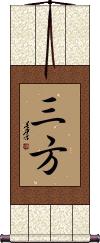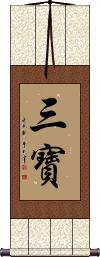Many custom options...
And formats...

Sanbo in Chinese / Japanese...
Buy a Sanbo calligraphy wall scroll here!
Personalize your custom “Sanbo” project by clicking the button next to your favorite “Sanbo” title below...
Sanbo
Three Treasures of Buddhism
The Triple Gem
三寶 is the title for “Three Precious Treasures of Buddhism” or “The Triple Gem.”
These three treasures are the Buddha 佛, the Dharma 法 (teachings or the law of the Buddha), and the Sangha 僧 (the community of monks or followers).
This term is used by most (perhaps not all) Buddhists in China, Japan, and South Korea (written the same in the original form but pronounced differently in each language). Non-Buddhists may just read this as “Three Treasures” without the religious context. For instance, there is also a “Three Treasures of Chinese Medicine” that is sometimes titled the same way.
In modern Japanese and Simplified Chinese, this is written 三宝 instead of 三寶.
Take Refuge in the Three Treasures
Not the results for sanbo that you were looking for?
Below are some entries from our dictionary that may match your sanbo search...
| Characters If shown, 2nd row is Simp. Chinese |
Pronunciation Romanization |
Simple Dictionary Definition |
三寶 三宝 see styles |
sān bǎo san1 bao3 san pao sanbou / sanbo さんぼう |
More info & calligraphy: Three Treasures of Buddhism(surname) Sanbou three treasures |
南無三寶 南无三宝 see styles |
nán wú sān bǎo nan2 wu2 san1 bao3 nan wu san pao namu sanbō |
More info & calligraphy: Take Refuge in the Three Treasures |
歸依三寶 归依三宝 see styles |
guī yī sān bǎo gui1 yi1 san1 bao3 kuei i san pao kie sanbō |
More info & calligraphy: Take Refuge in the Three Treasures |
三寳 三宝 see styles |
sān bǎo san1 bao3 san pao sanbō |
Triratna, or Ratnatraya, i.e. the Three Precious Ones: 佛 Buddha, 法 Dharma, 儈 Saṅgha, i.e. Buddha, the Law, the Ecelesia or Order. Eitel suggests this trinity may be adapted from the Trimūrti, i.e, Brahma, Viṣṇu, and Sīva. The Triratna takes many forms, e.g. the Trikāya 三身 q.v. There is also the Nepalese idea of a triple existence of each Buddha as a Nirvāṇa-Buddha, Dhyāni-Buddha, and Mānuṣi-Buddha; also the Tantric trinity of Vairocana as Nirvāṇa-Buddha, Locana according to Eitel "existing in reflex in the world of forms", and the human Buddha, Śākyamuni. There are other elaborated details known as the four and the six kinds of triratna 四 and 六種三寳, e.g. that the Triratna exists in each member of the trinity. The term has also been applied to the 三仙 q.v. Popularly the 三寳 are referred to the three images in the main hall of monasteries. The centre one is Śākyamuni, on his left Bhaiṣajya 藥師 and on his right Amitābha. There are other explanations, e.g. in some temples Amitābha is in the centre, Avalokiteśvara on his left, and Mahāsthāmaprāpta or Mañjuśrī on his right. Table of Triratna, Trikāya, and Trailokya: — DHARMASAṄGHABUDDHAEssential BodhiReflected BodhiPractical BodhiDhyāni BuddhaDhyāni BodhisattvaMānuṣī BuddhaDharmakāyaSambhogakāyaNirmāṇakāyaPurityCompletenessTransformations4th Buddha-kṣetra3rd Buddha-kṣetra1st and 2nd Buddha kṣetraArūpadhātuRūpadhātuKāmadhātu. |
三法 see styles |
sān fǎ san1 fa3 san fa sanbō |
The three dharma, i.e. 教法 the Buddha's teaching; 行法 the practice of it; 證法 realization or experiential proof of it in bodhi and nirvāṇa. |
三蛮 see styles |
sanboon さんぼーん |
(given name) Sanbo-n |
参謀 see styles |
sanbou / sanbo さんぼう |
(1) staff officer; military staff; (2) adviser; counselor; counsellor |
山房 see styles |
sanbou / sanbo さんぼう |
(1) mountain cottage; mountain hut; (2) temple; (3) study; (personal) library |
訕謗 讪谤 see styles |
shàn bàng shan4 bang4 shan pang sanbō |
to badmouth |
サンボ see styles |
sanbo サンボ |
(abbreviation) self-defence (defense) (type of wrestling) (rus: sambo) |
さん坊 see styles |
sanbou / sanbo さんぼう |
(personal name) Sanbou |
三寶種 三宝种 see styles |
sān bǎo zhǒng san1 bao3 zhong3 san pao chung sanbō shu |
seeds of the three treasures |
三寶藏 三宝藏 see styles |
sān bǎo zàng san1 bao3 zang4 san pao tsang sanbō zō |
The tritratna as the treasury of all virtue and merit; also the tripiṭaka, sūtras 經 vinaya 律, abhidharma 論; also śrāvakas, pratyekabuddhas, and bodhisattvas. |
三寶院 三宝院 see styles |
sān bǎo yuàn san1 bao3 yuan4 san pao yüan Sanbō in |
Sanbōin |
謗三寶 谤三宝 see styles |
bàng sān bǎo bang4 san1 bao3 pang san pao hō sanbō |
denigrating the three treasures |
一體三寶 一体三宝 see styles |
yī tǐ sān bǎo yi1 ti3 san1 bao3 i t`i san pao i ti san pao ittai no sanbō |
In the one body of the saṅgha is the whole triratna, Buddha, Dharma, and saṅgha. Also, Mind, Buddha, and the living, these three are without differentiation, 心佛與衆生是三無差別, i.e. are all one. |
三寶功德 三宝功德 see styles |
sān bǎo gōng dé san1 bao3 gong1 de2 san pao kung te sanbō kudoku |
merit of the three treasures |
三寶寺刹 三宝寺刹 see styles |
sān bǎo sì chà san1 bao3 si4 cha4 san pao ssu ch`a san pao ssu cha sanbō jisetsu |
temples of the three treasures |
三寶荒神 三宝荒神 see styles |
sān bǎo huāng shén san1 bao3 huang1 shen2 san pao huang shen Sanbō Kōjin |
wild deity of the three treasures |
三法無差 三法无差 see styles |
sān fǎ wú chā san1 fa3 wu2 cha1 san fa wu ch`a san fa wu cha sanbō musha |
idem 三無差別 q.v. |
化相三寶 化相三宝 see styles |
huà xiàng sān bǎo hua4 xiang4 san1 bao3 hua hsiang san pao kesō sanbō |
The nirmāṇakāya Buddha in the triratna forms; in Hīnayāna these are the human 16-foot Buddha, his dharma as revealed in the four axioms and twelve nidānas, and his sangha, or disciples, i. e. arhats and pratyekabuddhas. |
同體三寳 同体三寳 see styles |
tóng tǐ sān bǎo tong2 ti3 san1 bao3 t`ung t`i san pao tung ti san pao dōtai sanbō |
idem 一體三寳. |
歸命三寶 归命三宝 see styles |
guī mìng sān bǎo gui1 ming4 san1 bao3 kuei ming san pao kimyō sanbō |
to commit oneself to the three treasures |
自性三寶 自性三宝 see styles |
zì xìng sān bǎo zi4 xing4 san1 bao3 tzu hsing san pao jishō sanbō |
The triratna, each with its own characteristic, Buddha being wisdom 覺; the Law correctness 正; and the Order purity 淨. |
致敬三寶 致敬三宝 see styles |
zhì jìng sān bǎo zhi4 jing4 san1 bao3 chih ching san pao chikyō sanbō |
making obeisance to the three treasures |
謗三寶戒 谤三宝戒 see styles |
bàng sān bǎo jiè bang4 san1 bao3 jie4 pang san pao chieh hō sanbō kai |
One of the commandments against speaking falsely of the Three Precious Ones. |
三寶感通錄 三宝感通录 see styles |
sān bǎo gǎn tōng lù san1 bao3 gan3 tong1 lu4 san pao kan t`ung lu san pao kan tung lu Sanbō kanzū roku |
Sanbao gantong lu |
助謗三寶戒 助谤三宝戒 see styles |
zhù bàng sān bǎo jiè zhu4 bang4 san1 bao3 jie4 chu pang san pao chieh johō sanbō kai |
precept forbidding the denigrate of the three treasures |
歷代三寶記 历代三宝记 see styles |
lì dài sān bǎo jì li4 dai4 san1 bao3 ji4 li tai san pao chi Rekidai sanbō ki |
Lidai sanbao ji |
毀謗三寶戒 毁谤三宝戒 see styles |
huǐ bàng sān bǎo jiè hui3 bang4 san1 bao3 jie4 hui pang san pao chieh kihō sanbō kai |
precept forbidding the denigrate of the three treasures |
Click here for more sanbo results from our dictionary
The following table may be helpful for those studying Chinese or Japanese...
| Title | Characters | Romaji (Romanized Japanese) | Various forms of Romanized Chinese | |
| Sanbo | 三方 | sanbou / sanpou / mitsukata sanbo / sanpo / mitsukata | ||
| Three Treasures of Buddhism | 三寶 三宝 | san bou / sanbou / san bo | sān bǎo / san1 bao3 / san bao / sanbao | san pao / sanpao |
| Take Refuge in the Three Treasures | 南無三寶 南无三宝 | na mu san bou namusanbou na mu san bo | nán mo sān bǎo nan2 mo san1 bao3 nan mo san bao nanmosanbao | nan mo san pao nanmosanpao |
| In some entries above you will see that characters have different versions above and below a line. In these cases, the characters above the line are Traditional Chinese, while the ones below are Simplified Chinese. | ||||
Successful Chinese Character and Japanese Kanji calligraphy searches within the last few hours...






